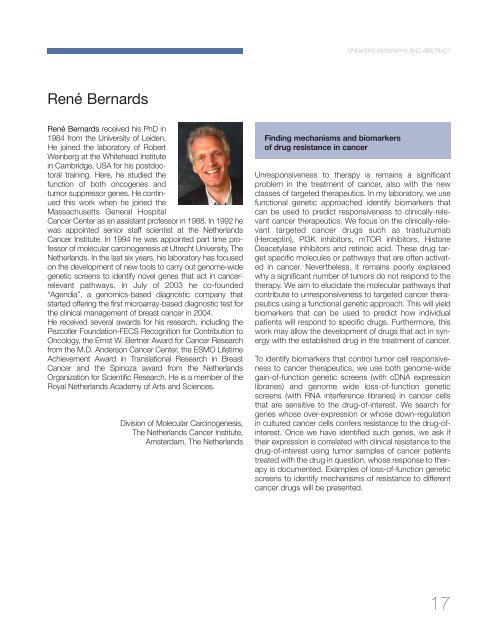PEBC Report - Programa de Epigenética y BiologÃa del Cáncer
PEBC Report - Programa de Epigenética y BiologÃa del Cáncer
PEBC Report - Programa de Epigenética y BiologÃa del Cáncer
Create successful ePaper yourself
Turn your PDF publications into a flip-book with our unique Google optimized e-Paper software.
SPEAKERS BIOGRAPHY AND ABSTRACT<br />
René Bernards<br />
René Bernards received his PhD in<br />
1984 from the University of Lei<strong>de</strong>n.<br />
He joined the laboratory of Robert<br />
Weinberg at the Whitehead Institute<br />
in Cambridge, USA for his postdoctoral<br />
training. Here, he studied the<br />
function of both oncogenes and<br />
tumor suppressor genes. He continued<br />
this work when he joined the<br />
Massachusetts General Hospital<br />
Cancer Center as an assistant professor in 1988. In 1992 he<br />
was appointed senior staff scientist at the Netherlands<br />
Cancer Institute. In 1994 he was appointed part time professor<br />
of molecular carcinogenesis at Utrecht University, The<br />
Netherlands. In the last six years, his laboratory has focused<br />
on the <strong>de</strong>velopment of new tools to carry out genome-wi<strong>de</strong><br />
genetic screens to i<strong>de</strong>ntify novel genes that act in cancerrelevant<br />
pathways. In July of 2003 he co-foun<strong>de</strong>d<br />
“Agendia”, a genomics-based diagnostic company that<br />
started offering the first microarray-based diagnostic test for<br />
the clinical management of breast cancer in 2004.<br />
He received several awards for his research, including the<br />
Pezcoller Foundation-FECS Recognition for Contribution to<br />
Oncology, the Ernst W. Bertner Award for Cancer Research<br />
from the M.D. An<strong>de</strong>rson Cancer Center, the ESMO Lifetime<br />
Achievement Award in Translational Research in Breast<br />
Cancer and the Spinoza award from the Netherlands<br />
Organization for Scientific Research. He is a member of the<br />
Royal Netherlands Aca<strong>de</strong>my of Arts and Sciences.<br />
Division of Molecular Carcinogenesis,<br />
The Netherlands Cancer Institute,<br />
Amsterdam, The Netherlands<br />
Finding mechanisms and biomarkers<br />
of drug resistance in cancer<br />
Unresponsiveness to therapy is remains a significant<br />
problem in the treatment of cancer, also with the new<br />
classes of targeted therapeutics. In my laboratory, we use<br />
functional genetic approached i<strong>de</strong>ntify biomarkers that<br />
can be used to predict responsiveness to clinically-relevant<br />
cancer therapeutics. We focus on the clinically-relevant<br />
targeted cancer drugs such as trastuzumab<br />
(Herceptin), PI3K inhibitors, mTOR inhibitors, Histone<br />
Deacetylase inhibitors and retinoic acid. These drug target<br />
specific molecules or pathways that are often activated<br />
in cancer. Nevertheless, it remains poorly explained<br />
why a significant number of tumors do not respond to the<br />
therapy. We aim to elucidate the molecular pathways that<br />
contribute to unresponsiveness to targeted cancer therapeutics<br />
using a functional genetic approach. This will yield<br />
biomarkers that can be used to predict how individual<br />
patients will respond to specific drugs. Furthermore, this<br />
work may allow the <strong>de</strong>velopment of drugs that act in synergy<br />
with the established drug in the treatment of cancer.<br />
To i<strong>de</strong>ntify biomarkers that control tumor cell responsiveness<br />
to cancer therapeutics, we use both genome-wi<strong>de</strong><br />
gain-of-function genetic screens (with cDNA expression<br />
libraries) and genome wi<strong>de</strong> loss-of-function genetic<br />
screens (with RNA interference libraries) in cancer cells<br />
that are sensitive to the drug-of-interest. We search for<br />
genes whose over-expression or whose down-regulation<br />
in cultured cancer cells confers resistance to the drug-ofinterest.<br />
Once we have i<strong>de</strong>ntified such genes, we ask if<br />
their expression is correlated with clinical resistance to the<br />
drug-of-interest using tumor samples of cancer patients<br />
treated with the drug in question, whose response to therapy<br />
is documented. Examples of loss-of-function genetic<br />
screens to i<strong>de</strong>ntify mechanisms of resistance to different<br />
cancer drugs will be presented.<br />
17


